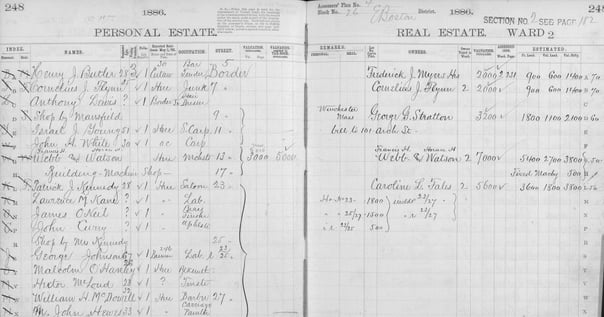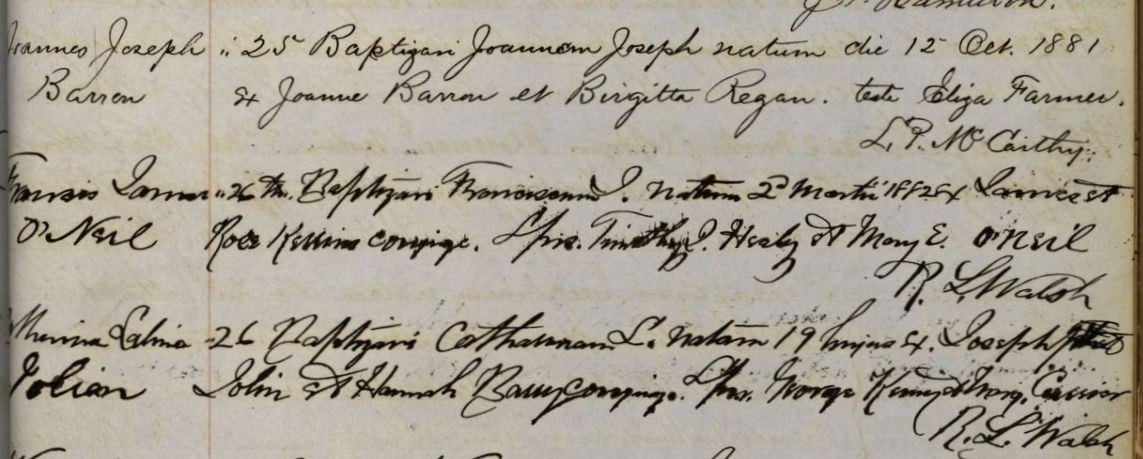 Note that Patrick J. Kennedy, John F. Kennedy's grandfather, appears two lines above James O'Neil's entry; both men are listed at 23 Border Street.
Note that Patrick J. Kennedy, John F. Kennedy's grandfather, appears two lines above James O'Neil's entry; both men are listed at 23 Border Street.
Over a year ago I wrote a Vita Brevis post about my great-great-great-grandfather, James O’Neil, who successfully sued the town of St. Johnsbury, Vermont, for the wrongful death of his daughter, Emily O’Neil. I had only recently learned that James had three children in Vermont before moving to Boston in the early 1870s: Mary Ellen (1864), Arthur Michael (1866), and Emily Ann (1867).
I know next to nothing about James’s life before he married his first wife, Mary Ellen Bray, in St. Johnsbury in 1863. Consensus says that he was born about 1843 in New York City to a John and Margaret O’Neil, which I think makes him one of a hundred such James O’Neils. The Bray family had jumped over the border into Quebec in the 1840s and 1850s, and it remains a possibility that James spent some time there before settling in St. Johnsbury. Why else would a first-generation Irish-American New Yorker end up in Vermont’s Northeast Kingdom? I am holding onto the naïve hope that I will never have to search a notarial index for the O’Neil family.
In Boston, James married Rosanna Kearins and had Patrick John (1874), Rosanna Marie “Annie” (1876), Emma Ada (1878), and James (1880–1881). In the 1870s and ‘80s, the family lived in East Boston, where James worked as a brass moulder.
Stories that my great-great-grandmother, Annie, had been an orphan led to the unsourced conclusion that James died shortly after his second wife.
On 14 October 1883, James’s second wife died, leaving him, at 40 years old, a widower for the second time. A victim of the charred 1890 census, James O’Neil drops from the historical record around this time. When I wrote last year’s post, an 1884 directory listing was the latest record I could attribute to him. Not much to go off. Stories that my great-great-grandmother, Annie, had been an orphan led to the unsourced conclusion that James died shortly after his second wife. I am not sure who inherited her secret decoder pin.
Renewing the search this past weekend, I looked at two record sets that I had only briefly examined before. The first, the tax records of Boston 1822–1918, have been browsable on Familysearch for several years, but for whatever reason the digital images end in 1882 before picking up in the 1910s. In their catalog, I found the expanded record set. This was a huge relief. The original tax books were never too far away at the Boston City Archives in West Roxbury, but if you understand the geography of Boston, and its traffic patterns, you will understand why I shelved that trip for a couple of years. Too much hassle for this armchair family historian to show up demanding to see the tax returns.
Picking up in 1882, I found James in Ward 2 (East Boston) in each of the next four years, identified by his occupation of brass moulder or finisher. The information in the tax record was by no means substantive, but it did confirm that James was alive as late as the 1886 tax year. In 1887, he drops from the tax lists in Ward 2, which might signal his death, or that he had moved out of East Boston. Interestingly, James’s oldest son, Arthur, first appears as his father drops out, in 1887.
Second, I reexamined the baptism and marriage registers for the Most Holy Redeemer Church in East Boston, the nearest Catholic church to where the O’Neil family lived in the 1870s and 1880s. A few years ago I had gone to the Archives of the Archdiocese of Boston in Braintree (sorry, City Archives, it was closer) to look for baptismal records for the second batch of O’Neil children. Redeemer’s records were not indexed, so I found each record by scanning through chronologically. I most wanted to know the names of the sponsors, who might have been O’Neil or Kearins relatives. I found the baptismal records for Annie, Emma, and James Jr., and left happy.
 This time around, I took a more measured approach. Most Holy Redeemer’s records have been digitized and placed online at AmericanAncestors.org as a part of our Historic Catholic Records project. Going page-by-page, I looked for records where James, or wife Rosanna, had been a witness or sponsor. Several hours later, I had found none. Better, I found a child I never knew about. Francis James O’Neil, son of James and Rose (Kerrins) O’Neil, was born on 2 March 1882. In hindsight, I should have known. It fit their modus operandi; James and Rosanna had their first child in 1874, and released a sequel every two years until her death in 1883.
This time around, I took a more measured approach. Most Holy Redeemer’s records have been digitized and placed online at AmericanAncestors.org as a part of our Historic Catholic Records project. Going page-by-page, I looked for records where James, or wife Rosanna, had been a witness or sponsor. Several hours later, I had found none. Better, I found a child I never knew about. Francis James O’Neil, son of James and Rose (Kerrins) O’Neil, was born on 2 March 1882. In hindsight, I should have known. It fit their modus operandi; James and Rosanna had their first child in 1874, and released a sequel every two years until her death in 1883.
I learned too that James’s oldest child, Mary Ellen O’Neil, must have come down to Boston after 1880, because she was one of her half-brother’s sponsors. She had been raised by her Bray grandparents, and this is the first record I have found for her outside of Vermont.
It underscores the impact that having the Archdiocese’s records digitized, and indexed, will have for anyone researching Catholic families in Eastern Massachusetts.
Francis J. O’Neil’s birth is not recorded in Massachusetts vital record collections, and it is fair to say that I might never have known he existed without that baptismal entry. It underscores the impact that having the Archdiocese’s records digitized, and indexed, will have for anyone researching Catholic families in Eastern Massachusetts. Knowing from the tax record that James outlived his wife by at least three years, it was easy to speculate that he might have remarried. Besides only being in his 40s, he had four children under the age of 10 to care for.
Less than a month after the death of Rosanna (Kearins) O’Neil, Most Holy Redeemer records the marriage of a James O’Neil and Margaret Forrestal on 11 November 1883. Turning to vital records, I can understand why the record had escaped my attention before. James’s birth date is several years later than expected, the marriage is listed as his second, and his birthplace is given as Ireland instead of New York. Plenty of conflicting evidence, but the parents are a match, and circumstantial evidence points to this being my James O’Neil.
I am coming out of this round of research with two exciting new leads that I hope will bring me closer to discovering what happened to James O’Neil in the later part of his life. Did he and Margaret have any children? When did he leave East Boston? And what happened to his unknown son, Francis James O’Neil? There’s a long way to go.
Share this:

About James Heffernan
James writes family histories for our Newbury Street Press imprint. He works closely with patrons to prepare meticulously researched volumes that match their family interests. James joined the staff of American Ancestors in 2015, working initially in Member Services, orienting visitors to our library campus in Boston, before spending several years as a genealogist preparing detailed reports for our Research and Library Services department. He is a frequent contributor to the Vita Brevis blog, the New England Historical and Genealogical Register, and American Ancestors magazine. His most recent work has focused on seventeenth-century New England immigrant origins, advancements in the field of genealogy, and strategies for connecting nineteenth and twentieth century immigrants to their birthplaces in Central and Eastern Europe. James works with our Education department to present lectures on American immigration history and research within the former territories of the Russian, German and Austrian Empires. Prior to his joining the team at American Ancestors, James worked in the conservation department of the John J. Burns library at Boston College, where he earned his BA, and the research library at Plimoth Patuxet Museums in Plymouth, Massachusetts.View all posts by James Heffernan →